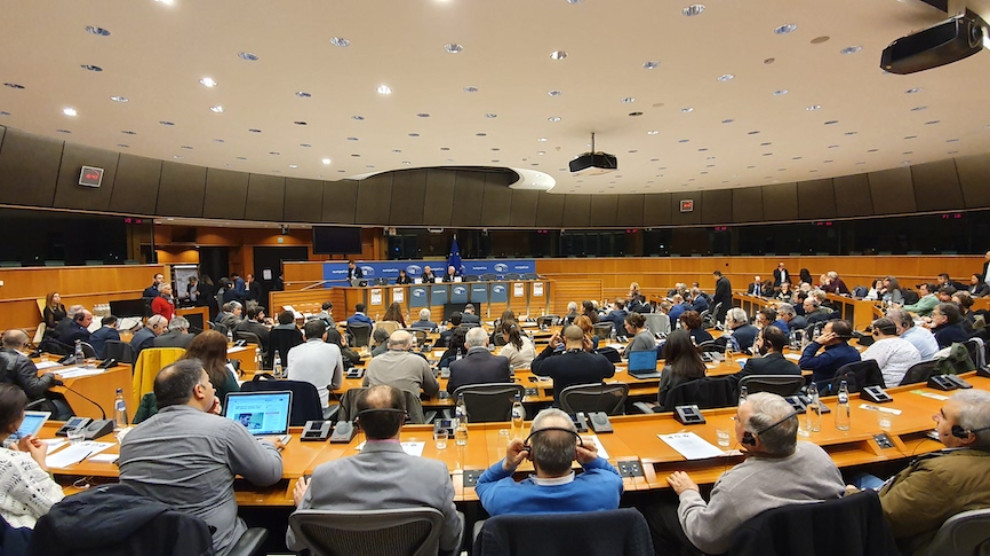Final declaration of the EP Conference on Rojava
Final Statement of the International Conference on North and East Syria (Rojava) held at the European Parliament on 11-12 December, 2019.
Final Statement of the International Conference on North and East Syria (Rojava) held at the European Parliament on 11-12 December, 2019.

The Kurdish Friendship Group in the European Parliament and representatives of the Self-Administration of North and East Syria (Rojava) in Europe, the International Alliance for the Defence of Rights and Freedoms (AIDL), and the Green / European Union (Free Alliance) held at the European Parliament on 11–12 December an international conference entitled “An International Conference on North and East Syria (Rojava): A Regional and Global Litmus Test”.
The conference was held with the participation of members of the organizing bodies, in addition to Members of the European Parliament, politicians, international organizations and bodies, jurists, researchers, academics, and the media.
Participants reviewed many files, and discussed many issues, related to North and East Syria (Rojava), foremost of which is the Turkish invasion, spearheaded by jihadist groups funded and trained by the Turkish government. The Turkish government continues to use Syrian refugees as blackmail against the European and international communities to divert attention away from its war crimes. The Turkish government continues to commit acts of genocide, ethnic cleansing, and demographic change against the Kurdish, Christian, Syriac and Arab populations in North and East Syria (Rojava). Such blatant acts of aggression constitute violations of international law and the principles of good neighbourliness and threaten international peace and security.
The aggression of the Turkish state and its jihadi proxies necessitated the establishment of this international conference, the organizers of which now call on the European Union (EU) and the international community to intervene in North and East Syria (Rojava) by taking a serious and resolute stance against Turkey’s reckless and unlawful actions.
We have all heard the discussions that shed light on Turkey's terrifying record of violations of human rights, international law, and the treaties brought about by the United Nations. The following are relevant treaty violations committed by the Turkish government:
1- Convention on the Prevention and Punishment of the Crime of Genocide, where the crime of genocide was committed against the Kurds and Arabs in the areas of Serekaniyê and Afrin.
2- International Convention on the Elimination of All Forms of Racial Discrimination, where all forms of racial discrimination are practised against the Kurds and various aforementioned minorities.
3- International Covenant on Economic, Social and Cultural Rights regarding Kurdish and other groups in the areas it occupied in Syria.
4- Convention against Torture and Other Cruel, Inhuman or Degrading Treatment or Punishment, International Humanitarian Law.
5- Four Geneva Conventions on War and their attached protocols.
6- International agreements on the prohibition of some types of weapons (biological, incendiary, landmines, etc), where white phosphorous was illegally used in Serekaniyê and Afrin.
7- Convention on the Elimination of All Forms of Discrimination against Women, where the Turkish state and its allied jihadi groups have systematically targeted women in North and East Syria (Rojava), such as the field execution of Kurdish politician Hevrîn Khalaf and the disfigurement of her body.
8- Convention on the Rights of the Child, where children have been killed and massacred, such as the killing of 8 children by Turkish shelling of Tal Rifaat on 3 December.
9- International Convention for the Suppression of the Financing of Terrorism, as Turkey funded, trained, and supported extremist militias and jihadi organizations.
The actions of the Turkish government clearly amount to war crimes and crimes against humanity, and arguably to genocide. These crimes against the Kurdish people and other components of North and East Syria (Rojava) such as Arabs, Syriacs and Christians require a strong international condemnation.
Accordingly, the conference concluded with a set of important recommendations that will be pursued by the formation of a joint follow-up committee, which reports to the EU Parliament, other EU institutions, and relevant international bodies. The recommendations are:
1- Full condemnation of the Turkish aggression against and partial occupation of North and East Syria (Rojava) by a resolute stance from the European Parliament and the United Nations, among others.
2- The withdrawal of the Turkish army and its jihadi proxies from all areas they have occupied in North and East Syria (Rojava), including Afrin and Idlib, among others.
3- Securing the safe and dignified return of all displaced people to their homes.
4- Inclusion of all Turkish and its allied jihadi proxies that have participated in the invasion and the ensuing crimes on international lists of terrorist organizations, and the activation of a mechanism of oversight and accountability to ensure justice is served.
5- The formation of a local court with international sponsorship in North and East Syria (Rojava) to prosecute Turkish, jihadists (including ISIS militants), and any other individuals suspected of being involved in war crimes. This includes the Turkish President, Recep Tayyip Erdogan, as he is primarily responsible for all violations and crimes that have occurred.
6- The inclusion of the Self-Administration of North and East Syria (Rojava) in the UN-led Constitutional Committee tasked to draft a new constitution for Syria.
7- The consideration of the implementation of a no-fly-zone over North and East Syria (Rojava).
8- The recognition of the Self-Administration of North and East Syria (Rojava) by international institutions such as the EU and the UN as well as foreign states.